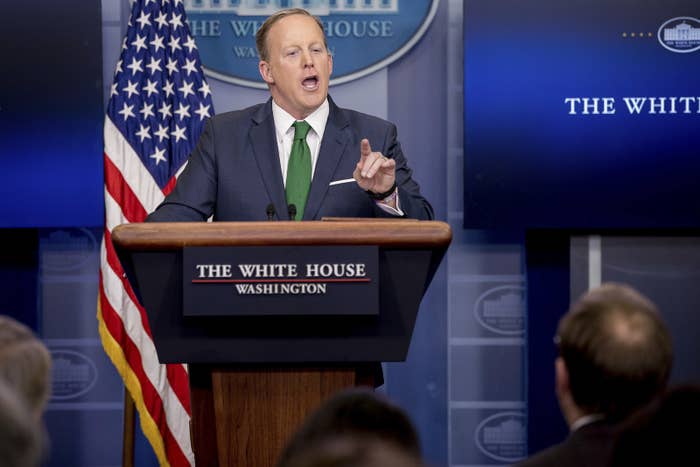
LONDON — The White House doubled down Friday and said it's not issuing an apology to the British government for claiming the UK's GCHQ intelligence agency spied on Donald Trump for the Obama administration.
“I don’t think we regret anything," press secretary Sean Spicer said Friday afternoon, after a frantic attempt to paper over the controversy on Friday.
Here's how we got to this point.
Spicer repeated the allegation on Thursday from a White House podium. Less than 24 hours later, on Friday morning, British government sources briefed news outlets that the US had apologized. The Telegraph, quoting intelligence sources, even reported the apology came direct from Spicer and National Security Adviser H. R. McMaster.
In an on-the-record statement, a Downing Street spokesperson said the UK government "made clear the allegations were ridiculous and received reassurances that they would not be repeated" following a discussion with US counterparts.
But US officials have been disputed whether the Trump administration had gone as far as an apology. One administration source told BuzzFeed News: "The UK demanded an apology, NSC worked overnight to try and smooth things over."
The White House told reporters on Friday that British ambassador to Washington Kim Darroch and Sir Mark Lyall, the UK national security adviser, had expressed their concerns to Spicer and McMaster, who had explained that Spicer was simply pointing to public reports, not endorsing any specific story.
One senior White House official, however, told the New York Times that Spicer offered no regret or apology.
"He didn’t apologize, no way, no how,” the official was quoted as saying.
The ambiguity over whether there was an apology puts pressure on Trump aides to clarify the exact nature of the conversation. Trump is legendarily opposed to apologizing.
The diplomatic row between the White House and its closest intelligence partner broke out on Thursday when Spicer cited Fox & Friends' Tuesday show while trying to defend the president's allegation of wiretapping. On the program, Fox News' judicial analyst Andrew Napolitano claimed that three intelligence sources had told him Obama had called on the services of GCHQ.
That prompted GCHQ to break years of protocol and make an extremely rare public comment, describing claims it had been asked by the Obama administration to conduct surveillance on then-presidential candidate Donald Trump as "utterly ridiculous."
A British defense official who works with the US at a joint command center told BuzzFeed News that “professionals from both countries were aghast” at the allegations and the way they were handled.
.@Judgenap: Three intel sources have disclosed that Pres. Obama turned to British spies to get surveillance on Trump
In a statement, a spokesman for the British agency rejected the claim.
"Recent allegations made by media commentator Judge Andrew Napolitano about GCHQ being asked to conduct 'wire tapping' against the then-president-elect are nonsense," the agency said. "They are utterly ridiculous and should be ignored."
The report, however, was among those cited by Spicer during a tense press briefing at the White House Thursday.
"All we're doing is literally reading off what other stations and people have reported, and I think that casts into concern some of the activities that may have occurred during the 2016 election," Spicer said. "I think that the idea is to say, 'If these organizations and these individuals came to these conclusions, they merit looking into.'"
Spicer also cited multiple New York Times reports that have referred to intercepted communications that are part of an inquiry into possible Russian connections to Trump's campaign.
The articles, including one published on Jan. 20 that has been repeatedly cited by Trump and Spicer, mention intercepted communications involving foreign officials, but do not claim the president was "wiretapped," as he claimed in a series of tweets.
Spicer defended the president's claims and refused to offer any evidence to back up the extraordinary allegation after the chair and vice chair of the Senate Intelligence Committee said there were "no indications" that Trump Tower was the subject of surveillance by any element of the United States government.

